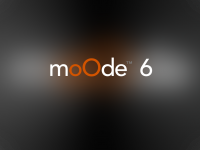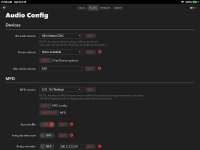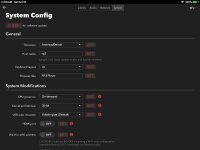If your original pi still works then there's not much to be achieved by updating, audio takes little cpu processing power unless you are performing dsp type functions in software. If you need to scan a large audio library then the extra cpu speed may help.
I have an old, original rpi. Is it better to upgrade to any newer version in order to get better performance or an original rpi is enough to enjoy music and moode player?
You don't state your current MoOde version... anyway, probably it is best you buy a quality 8GB uSD card, install whichever newer MoOde version you can get and decide for yourself. Try at the beginning the standard playback features just to avoid overloading the CPU and the memory... and take it from there. ... and by the way, this MoOde thread is rather 'dead' for a good while with the exception to posts from people who are not usual MoOde users or people who cannot be bothered to read the whole thread or parts of it. The new dedicated MoOde forum has been advertised here many times, but... Give it a try: Moode Forum
Hi,
moOde 6.0.0 is available for download at moodeaudio.org 🙂
This release is based on the new Raspbian 10.0 (Buster) operating system and includes support for the Raspberry Pi-4B 1/2/4GB models, a new UPnP Media Browser, enhancements to the Library, updated core components and important bug fixes and improvements. Also included is MPD 0.21.13 for testing purposes. MPD 0.20.23 continues to be the default version of MPD used in moOde. Refer to the Release Notes for more information.. Moode Audio Player * GitHub
-Tim
moOde 6.0.0 is available for download at moodeaudio.org 🙂
This release is based on the new Raspbian 10.0 (Buster) operating system and includes support for the Raspberry Pi-4B 1/2/4GB models, a new UPnP Media Browser, enhancements to the Library, updated core components and important bug fixes and improvements. Also included is MPD 0.21.13 for testing purposes. MPD 0.20.23 continues to be the default version of MPD used in moOde. Refer to the Release Notes for more information.. Moode Audio Player * GitHub
-Tim
Attachments
I installed it in my RPI3B+ and it took me some 10 minutes to setup. Spotify Connect, Airplay, Bluetooth, all worked fine. I tried to google, but was not successful - is there a way to integrate Spotify directly into the device? I saw that with Volumio, it should be possible in Moode as well.
Last edited:
Hi,
moOde 6.3.0 is available for download at moodeaudio.org 🙂
This release includes important bug fixes and improvements including support for Allo USBridge SIG, enhanced Eth driver, Comfast CF-912AC dual-band WiFi adapter driver, Library option for Album grouping by Artist, Album or Year, and options for 64-bit Linux kernel (testing) and MPD 0.21.15 (testing).
This release is based on Raspbian Buster Lite 10.1 (2019-09-26) and Linux kernel 4.19.75 build #1270
Refer to the Release Notes for more information.
moode/relnotes.txt at master * moode-player/moode * GitHub
-Tim
moOde 6.3.0 is available for download at moodeaudio.org 🙂
This release includes important bug fixes and improvements including support for Allo USBridge SIG, enhanced Eth driver, Comfast CF-912AC dual-band WiFi adapter driver, Library option for Album grouping by Artist, Album or Year, and options for 64-bit Linux kernel (testing) and MPD 0.21.15 (testing).
This release is based on Raspbian Buster Lite 10.1 (2019-09-26) and Linux kernel 4.19.75 build #1270
Refer to the Release Notes for more information.
moode/relnotes.txt at master * moode-player/moode * GitHub
-Tim
Attachments
Hi,
I have plans to stream from MacbookPro/Audirvana/UPnP via wired ethernet to the new USBridge Signature/Moode Audio.
Do for this set-up exist settings in Moode for best sound quality?
Thanks
Matt
I have plans to stream from MacbookPro/Audirvana/UPnP via wired ethernet to the new USBridge Signature/Moode Audio.
Do for this set-up exist settings in Moode for best sound quality?
Thanks
Matt
Hi,
For my SIG + Katana (SQ output board, no Isolator board) I use a configuration like below. it's mostly just the default moOde OOB settings except that I typically run the latest 0.21.y series of MPD to be able to take advantage of all the bug fixes and improvements.
Also if you are using an ESS based DAC that exposes it's on-chip hardware volume controller to ALSA then you can set MPD volume control to "Hardware" and according to ESS you get a volume controller thats almost as good as the very best Analog volume controllers. http://www.esstech.com/files/3014/4095/4308/digital-vs-analog-volume-control.pdf
- MPD volume control = Hardware
- Other DSP features = Off
- Default options for the ESS chip: (1) Oversampling filter = Apodising Fast Roll-off filter, (2) De-emphasis = Bypass, (3) Dop = on
- CPU governor = On-demand
- Kernel architecture = 32-bit
- HDMI port = Off
- Wait for eth0 address = Off
- WiFi adapter is a Comfast CF-912AC dual-band
-Tim
For my SIG + Katana (SQ output board, no Isolator board) I use a configuration like below. it's mostly just the default moOde OOB settings except that I typically run the latest 0.21.y series of MPD to be able to take advantage of all the bug fixes and improvements.
Also if you are using an ESS based DAC that exposes it's on-chip hardware volume controller to ALSA then you can set MPD volume control to "Hardware" and according to ESS you get a volume controller thats almost as good as the very best Analog volume controllers. http://www.esstech.com/files/3014/4095/4308/digital-vs-analog-volume-control.pdf
- MPD volume control = Hardware
- Other DSP features = Off
- Default options for the ESS chip: (1) Oversampling filter = Apodising Fast Roll-off filter, (2) De-emphasis = Bypass, (3) Dop = on
- CPU governor = On-demand
- Kernel architecture = 32-bit
- HDMI port = Off
- Wait for eth0 address = Off
- WiFi adapter is a Comfast CF-912AC dual-band
-Tim
Attachments
Last edited:
Hi,
For my SIG + Katana (SQ output board, no Isolator board) I use a configuration like below. it's mostly just the default moOde OOB settings except that I typically run the latest 0.21.y series of MPD to be able to take advantage of all the bug fixes and improvements.
Also if you are using an ESS based DAC that exposes it's on-chip hardware volume controller to ALSA then you can set MPD volume control to "Hardware" and according to ESS you get a volume controller thats almost as good as the very best Analog volume controllers. http://www.esstech.com/files/3014/4095/4308/digital-vs-analog-volume-control.pdf
- MPD volume control = Hardware
- Other DSP features = Off
- Default options for the ESS chip: (1) Oversampling filter = Apodising Fast Roll-off filter, (2) De-emphasis = Bypass, (3) Dop = on
- CPU governor = On-demand
- Kernel architecture = 32-bit
- HDMI port = Off
- Wait for eth0 address = Off
- WiFi adapter is a Comfast CF-912AC dual-band
-Tim
Thanks Tim,
I forgot to mention that I would like to go for an USB-DAC like the upcoming Revolution DAC from Allo and I would like to let Audirvana do all DSD converting or upsampling.
So the signal path through Moode should be as pure as possible.
Does this change some settings you mentioned?
Thanks again.
Matt
Last edited:
Also if you are using an ESS based DAC that exposes it's on-chip hardware volume controller to ALSA then you can set MPD volume control to "Hardware" and according to ESS you get a volume controller thats almost as good as the very best Analog volume controllers. http://www.esstech.com/files/3014/4095/4308/digital-vs-analog-volume-control.pdf
ESS does in its chip the very same division of samples by a fixed number like any software volume does. The same sample value will reach the actual DAC stage. That PDF just discusses advantage of digital volume on higher bitwidth. While the ESS chips are very good, they still have not reached real 24bit resolution. Division in both 32bits and 24bits will have the lowest bits below the DAC noise floor and the higher bits are identical for both cases.
Yes of course, math and physics guarantees there will be a limit to the true resolution of the device.
Thanks Tim,
I forgot to mention that I would like to go for an USB-DAC like the upcoming Revolution DAC from Allo and I would like to let Audirvana do all DSD converting or upsampling.
So the signal path through Moode should be as pure as possible.
Does this change some settings you mentioned?
Thanks again.
Matt
If u are using moOde just as a UPnP renderer and i assume controlling volume with Audirvana or some downstream volume control device then you would want to set MPD volume to "Disabled (0dB)".
If u are using moOde just as a UPnP renderer and i assume controlling volume with Audirvana or some downstream volume control device then you would want to set MPD volume to "Disabled (0dB)".
Yes, volume control with analog preamp downstream.
With a wired ethernet connection to the SIG the setting would be:
Wait for eth0 address: ON
Correct?
I have searched many forums and did not found many issues in working together of Audirvana and Moode as UPnP renderer.
What is your experience?
Thanks
Matt
Last edited:
Yes. When it's ON moOde waits up to 9 seconds for an IP address to be assigned before continuing its start up sequence. Typically an IP address is already assigned before moOde startup begins and so no wait occurs.
Hi,
i want to protect the settings page with an password, so that only i can only change the settings, but i cannot override the source.
does anyone knows why it's protected
Thanks
i want to protect the settings page with an password, so that only i can only change the settings, but i cannot override the source.
does anyone knows why it's protected
Thanks
Hi Tim,
cdsgames reported on the Shanti thread that USBridge Sig. does support up to DSD512.
I assume he tested it with MoOde.
I want to send high rate native DSD (not DoP) via UPnP to the SIG/MoOde and then to USB-DAC.
Do exist MoOde settings so that DSD stays native and does not get converted into DoP or PCM?
Thanks
Matt
cdsgames reported on the Shanti thread that USBridge Sig. does support up to DSD512.
I assume he tested it with MoOde.
I want to send high rate native DSD (not DoP) via UPnP to the SIG/MoOde and then to USB-DAC.
Do exist MoOde settings so that DSD stays native and does not get converted into DoP or PCM?
Thanks
Matt
Hi,
Below is from the MPD manual.
User’s Manual — Music Player Daemon 0.22 documentation
"Native DSD playback is used automatically if available. DoP is only used if enabled explicitly using the dop option, because there is no way for MPD to find out whether the DAC supports it. DSD to PCM conversion is the fallback if DSD cannot be used directly."
Below is from the MPD manual.
User’s Manual — Music Player Daemon 0.22 documentation
"Native DSD playback is used automatically if available. DoP is only used if enabled explicitly using the dop option, because there is no way for MPD to find out whether the DAC supports it. DSD to PCM conversion is the fallback if DSD cannot be used directly."
Moode6
Ive installed and upgraded to the latest Moode but wish to use it as an access point. All good but what IP should I enter now.
Thanks
Ive installed and upgraded to the latest Moode but wish to use it as an access point. All good but what IP should I enter now.
Thanks
Found it.
You'll find a lot more info over at -Moode Forum
Glad to hear you got it working
Happy Listening
Ian
- Home
- Source & Line
- PC Based
- Moode Audio Player for Raspberry Pi




